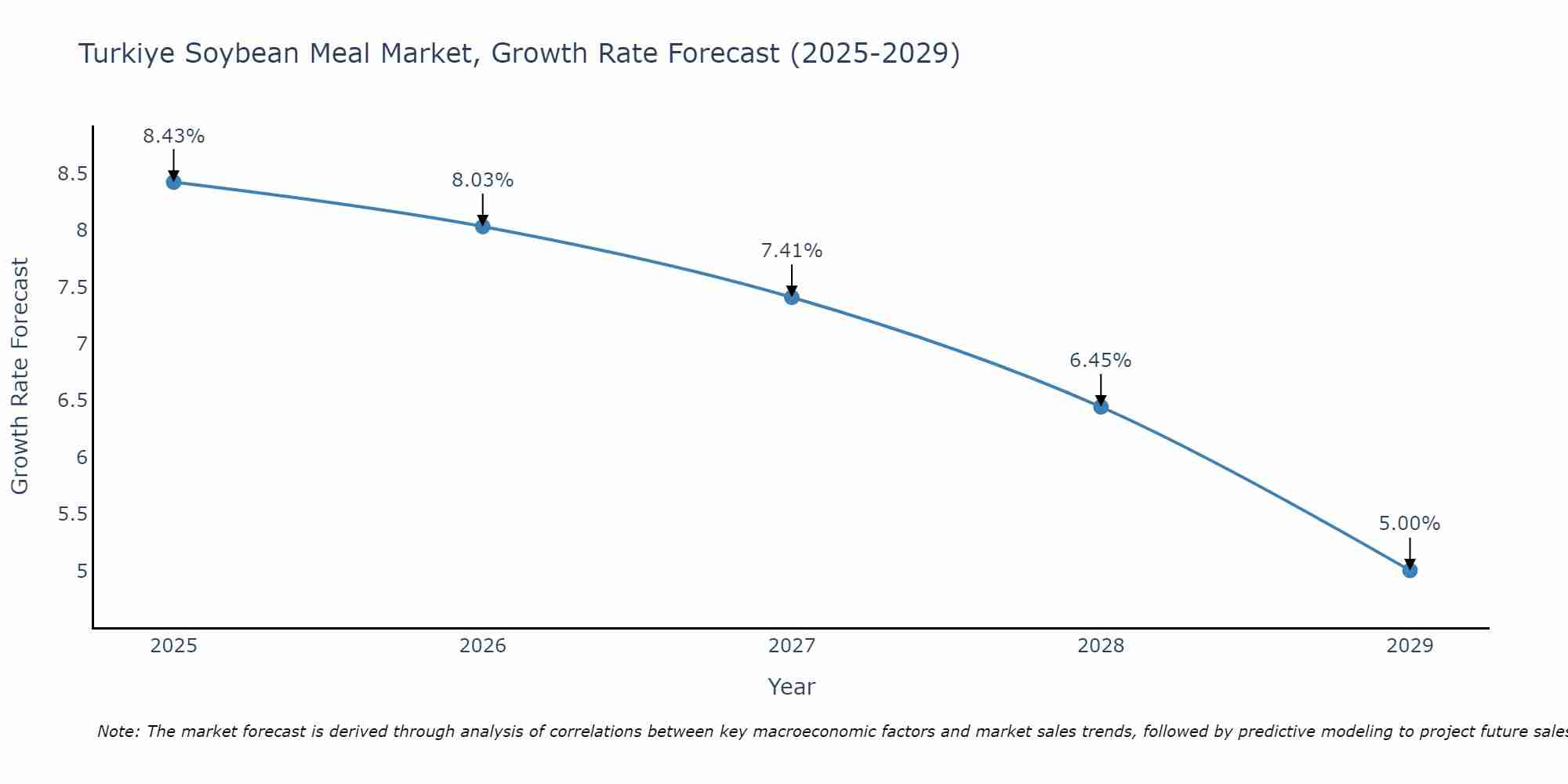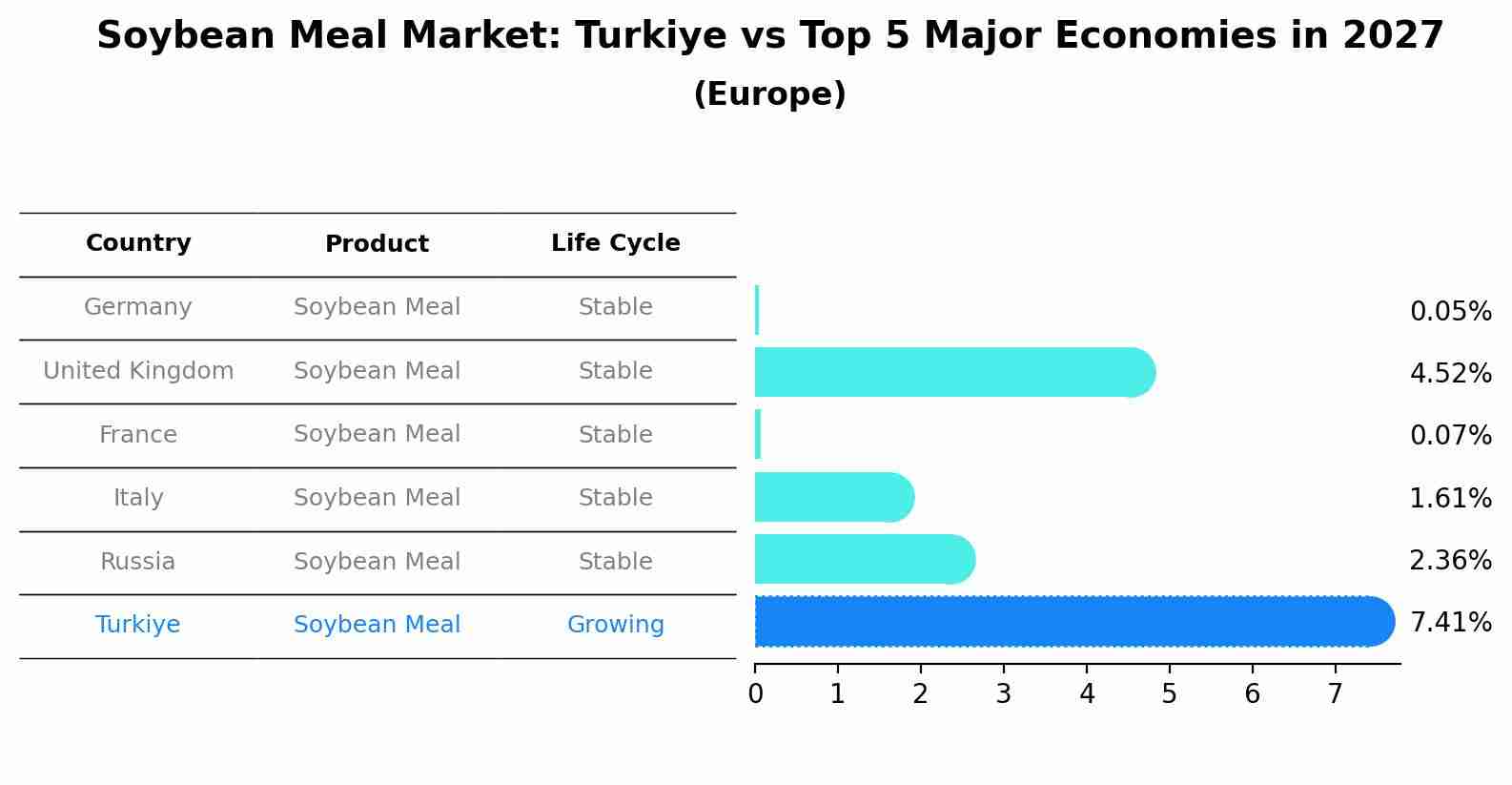Turkey Soybean Meal Market Outlook | Size, Trends, COVID-19 IMPACT, Analysis, Value, Revenue, Companies, Growth, Industry, Share & Forecast
| Product Code: ETC384998 | Publication Date: Aug 2022 | Updated Date: Jul 2025 | Product Type: Market Research Report | |
| Publisher: 6Wresearch | Author: Dhaval Chaurasia | No. of Pages: 75 | No. of Figures: 35 | No. of Tables: 20 |
Turkiye Soybean Meal Market Size Growth Rate
The Turkiye Soybean Meal Market may undergo a gradual slowdown in growth rates between 2025 and 2029. Starting high at 8.43% in 2025, the market steadily declines to 5.00% by 2029.

Soybean Meal Market: Turkiye vs Top 5 Major Economies in 2027 (Europe)
The Soybean Meal market in Turkiye is projected to grow at a growing growth rate of 7.41% by 2027, highlighting the country's increasing focus on advanced technologies within the Europe region, where Germany holds the dominant position, followed closely by United Kingdom, France, Italy and Russia, shaping overall regional demand.

Turkey Soybean Meal Market Synopsis
The Turkey soybean meal market is experiencing steady growth driven by the increasing demand for animal feed within the country`s livestock industry. Soybean meal is a key protein source used in animal feed formulations for poultry, livestock, and aquaculture. The market is influenced by factors such as the expansion of the livestock industry, rising disposable incomes, and growing awareness about the benefits of soybean meal in animal nutrition. Turkey imports a significant amount of soybean meal to meet its domestic demand, with major suppliers including countries like the United States, Brazil, and Argentina. The market is also witnessing a trend towards sustainable and organic soybean meal production, driven by consumer preferences for ethically sourced and environmentally friendly feed ingredients. Overall, the Turkey soybean meal market is poised for continued growth in the coming years.
Turkey Soybean Meal Market Trends
The Turkey Soybean Meal Market is experiencing several key trends. Firstly, there is a growing demand for soybean meal as a protein source in animal feed due to its high nutritional value. Additionally, the market is witnessing an increasing focus on sustainable and organic soybean meal production methods to meet the rising consumer preferences for environmentally friendly products. Another trend is the expansion of soybean meal processing facilities in Turkey, which is contributing to the growth of the market. Furthermore, the market is also influenced by global factors such as fluctuating soybean prices and trade policies. Overall, these trends indicate a positive outlook for the Turkey Soybean Meal Market with opportunities for both domestic producers and international suppliers to capitalize on the growing demand.
Turkey Soybean Meal Market Challenges
In the Turkey Soybean Meal Market, a major challenge is the dependency on imports due to limited domestic production. This dependence on external sources exposes the market to fluctuations in global soybean prices and currency exchange rates, impacting the overall cost structure for local manufacturers and consumers. Additionally, the market faces competition from alternative protein sources and varying consumer preferences, leading to demand uncertainties. Furthermore, regulatory constraints and trade policies can also pose challenges for market participants, affecting supply chain dynamics and import/export procedures. Overall, navigating these challenges requires strategic planning, market intelligence, and a proactive approach to mitigating risks in the Turkey Soybean Meal Market.
Turkey Soybean Meal Market Investment Opportunities
Investment opportunities in the Turkey soybean meal market are promising due to the country`s growing demand for animal feed products. With the increasing focus on livestock production and the poultry industry in Turkey, there is a corresponding rise in the need for soybean meal as a key source of protein in animal feed. This presents a lucrative opportunity for investors to capitalize on the rising demand by investing in soybean meal production facilities, trading of soybean meal commodities, or engaging in partnerships with local feed manufacturers. Additionally, exploring innovative solutions for sustainable soybean meal production and distribution channels can also be a strategic investment avenue in the Turkey market. Overall, the Turkey soybean meal market offers potential for growth and profitability for investors looking to participate in the country`s agriculture and livestock sectors.
Jordan Agar Market Government Policies
The Turkish government has implemented several policies related to the soybean meal market to support domestic production and ensure food security. These policies include import tariffs on soybean meal to protect local producers, subsidies for soybean farmers to encourage cultivation, and regulations on quality standards to safeguard consumer health. Additionally, the government has invested in research and development initiatives to improve the efficiency and sustainability of soybean meal production in Turkey. These policies aim to reduce dependency on imports, boost domestic production, and enhance the competitiveness of the Turkish soybean meal market both locally and internationally.
Turkey Soybean Meal Market Future Outlook
The future outlook for the Turkey Soybean Meal Market appears positive due to increasing demand for soybean meal as a protein source in animal feed. Turkey`s growing livestock industry, particularly poultry and aquaculture sectors, is expected to drive the demand for soybean meal as feed ingredient. Additionally, the rising consumer awareness about the nutritional benefits of soy products is likely to fuel the market growth. However, challenges such as fluctuating soybean prices, regulatory constraints, and competition from alternative protein sources could impact the market dynamics. Overall, with supportive factors such as increasing meat consumption, expanding livestock production, and a shift towards sustainable feed ingredients, the Turkey Soybean Meal Market is anticipated to witness steady growth in the coming years.
Key Highlights of the Report:
- Turkey Soybean Meal Market Outlook
- Market Size of Turkey Soybean Meal Market, 2021
- Forecast of Turkey Soybean Meal Market, 2031
- Historical Data and Forecast of Turkey Soybean Meal Revenues & Volume for the Period 2018 - 2031
- Turkey Soybean Meal Market Trend Evolution
- Turkey Soybean Meal Market Drivers and Challenges
- Turkey Soybean Meal Price Trends
- Turkey Soybean Meal Porter's Five Forces
- Turkey Soybean Meal Industry Life Cycle
- Historical Data and Forecast of Turkey Soybean Meal Market Revenues & Volume By Application for the Period 2018 - 2031
- Historical Data and Forecast of Turkey Soybean Meal Market Revenues & Volume By Animal Feed for the Period 2018 - 2031
- Historical Data and Forecast of Turkey Soybean Meal Market Revenues & Volume By Food Industry for the Period 2018 - 2031
- Historical Data and Forecast of Turkey Soybean Meal Market Revenues & Volume By Beverage for the Period 2018 - 2031
- Historical Data and Forecast of Turkey Soybean Meal Market Revenues & Volume By Healthcare Products for the Period 2018 - 2031
- Turkey Soybean Meal Import Export Trade Statistics
- Market Opportunity Assessment By Application
- Turkey Soybean Meal Top Companies Market Share
- Turkey Soybean Meal Competitive Benchmarking By Technical and Operational Parameters
- Turkey Soybean Meal Company Profiles
- Turkey Soybean Meal Key Strategic Recommendations
Frequently Asked Questions About the Market Study (FAQs):
- Single User License$ 1,995
- Department License$ 2,400
- Site License$ 3,120
- Global License$ 3,795
Search
Thought Leadership and Analyst Meet
Our Clients
Related Reports
- Canada Oil and Gas Market (2026-2032) | Share, Segmentation, Value, Industry, Trends, Forecast, Analysis, Size & Revenue, Growth, Competitive Landscape, Outlook, Companies
- Germany Breakfast Food Market (2026-2032) | Industry, Share, Growth, Size, Companies, Value, Analysis, Revenue, Trends, Forecast & Outlook
- Australia Briquette Market (2025-2031) | Growth, Size, Revenue, Forecast, Analysis, Trends, Value, Share, Industry & Companies
- Vietnam System Integrator Market (2025-2031) | Size, Companies, Analysis, Industry, Value, Forecast, Growth, Trends, Revenue & Share
- ASEAN and Thailand Brain Health Supplements Market (2025-2031) | Strategy, Consumer Insights, Analysis, Investment Trends, Opportunities, Growth, Size, Share, Industry, Revenue, Segments, Value, Segmentation, Supply, Forecast, Restraints, Outlook, Competition, Drivers, Trends, Demand, Pricing Analysis, Competitive, Strategic Insights, Companies, Challenges
- ASEAN Bearings Market (2025-2031) | Strategy, Consumer Insights, Analysis, Investment Trends, Opportunities, Growth, Size, Share, Industry, Revenue, Segments, Value, Segmentation, Supply, Forecast, Restraints, Outlook, Competition, Drivers, Trends, Demand, Pricing Analysis, Competitive, Strategic Insights, Companies, Challenges
- Europe Flooring Market (2025-2031) | Outlook, Share, Industry, Trends, Forecast, Companies, Revenue, Size, Analysis, Growth & Value
- Saudi Arabia Manlift Market (2025-2031) | Outlook, Size, Growth, Trends, Companies, Industry, Revenue, Value, Share, Forecast & Analysis
- Uganda Excavator, Crane, and Wheel Loaders Market (2025-2031) | Strategy, Consumer Insights, Analysis, Investment Trends, Opportunities, Growth, Size, Share, Industry, Revenue, Segments, Value, Segmentation, Supply, Forecast, Restraints, Outlook, Competition, Drivers, Trends, Demand, Pricing Analysis, Competitive, Strategic Insights, Companies, Challenges
- Rwanda Excavator, Crane, and Wheel Loaders Market (2025-2031) | Strategy, Consumer Insights, Analysis, Investment Trends, Opportunities, Growth, Size, Share, Industry, Revenue, Segments, Value, Segmentation, Supply, Forecast, Restraints, Outlook, Competition, Drivers, Trends, Demand, Pricing Analysis, Competitive, Strategic Insights, Companies, Challenges
Industry Events and Analyst Meet
Whitepaper
- Middle East & Africa Commercial Security Market Click here to view more.
- Middle East & Africa Fire Safety Systems & Equipment Market Click here to view more.
- GCC Drone Market Click here to view more.
- Middle East Lighting Fixture Market Click here to view more.
- GCC Physical & Perimeter Security Market Click here to view more.
6WResearch In News
- Doha a strategic location for EV manufacturing hub: IPA Qatar
- Demand for luxury TVs surging in the GCC, says Samsung
- Empowering Growth: The Thriving Journey of Bangladesh’s Cable Industry
- Demand for luxury TVs surging in the GCC, says Samsung
- Video call with a traditional healer? Once unthinkable, it’s now common in South Africa
- Intelligent Buildings To Smooth GCC’s Path To Net Zero


















